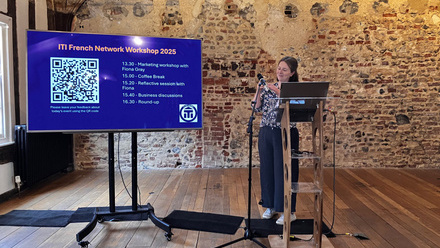12 forms of CPD you might not have thought of
Exploring some activities that may not immediately spring to mind as being obvious forms of CPD.
Think CPD (Continuing Professional Development) and you tend to think workshops, webinars, courses and conferences. But there’s so much more to CPD than that. Thanks to my colleagues on the ITI SUFT course who have contributed their ideas and experiences to this blog. Before I delve into our 12 suggestions you may not have thought of as CPD, a couple of tips:
- Get into the habit of keeping track of the hours you spend on these less obvious forms of CPD. I find Toggl a very useful tool for this.
- And when you log a regular CPD activity such as #1 below in the ITI CPD logging tool, you don’t need to enter every session individually. Simply enter the total number of hours and the date of the last session under ‘Date completed’ at the end of the membership year or when you finish the activity.
1. Virtual source language conversation practice
Regular Skype or Zoom conversation sessions with a native speaker of your source language. Fiona Gray says: ‘As I don’t have much opportunity to speak in my source language otherwise, this is a great opportunity to practise and build up my confidence ready for when I need to jump on a call with a client.’ I have been doing the same with a Dutch colleague for a while now: we speak Dutch for half the session for my benefit and English in the other half for hers.
2. TV, podcasts, YouTube
Watching YouTube videos and foreign language TV and listening to podcasts are a great way to keep your source language skills on track – or your target language, if you live in your source language country. But tempting though it may be to log a 30-hour TV series as your CPD for the year, always aim for a variety of CPD activities.
3. Keeping a translation journal
Jakub Sacharczuk started keeping a translation journal – an idea he took from MA translation programmes – when he started translating documents for use in court. Wording of translations would be challenged, justified and ruled on by the judge. Keeping a journal helps him keep a record of decisions made, supporting reasons, etc.
4. Organising a professional event
As Lloyd Bingham says, any relevant role that involves communicating or writing in your source or target language, such as organising a professional event for an ITI network or an external business group such as a Chamber of Commerce, counts as CPD. This could fall under ‘professional contribution’ or ‘language skills’.
5. Preparing for talks, webinars, etc.
Karen Tkaczyk reminds us that all stages involved in preparing a presentation, conference talk or webinar count as CPD: not simply researching and writing the content but also writing an abstract for submission and checking that the content of your presentation is up to date before you deliver it. That can take up a lot of time, so don’t forget to keep track of the hours you spend on it.
6. Writing articles, blogs or reviews
Writing anything for publication in a journal, newsletter or industry blog counts as CPD. ITI and its networks and groups always appreciate receiving reviews of recent events for publication in the Bulletin or the network newsletter, and ITI is always looking for blog contributors. Having an article or review published is also a great way to raise your profile in the industry.
7. Pro-bono work
Joanna Waller recommends pro-bono translation and interpreting work not only as a way of gaining experience early on in your career but also as an entrée to many different and new areas of expertise. All pro-bono translation/interpreting assignments, including the preparation and research you undertake for them, count as CPD.
8. Volunteering on a committee or in a network
Whether it’s at ITI or an external organisation related to your translating or interpreting work, volunteering counts as a professional contribution and therefore as CPD. ITI groups and networks are often looking for volunteers – plus it’s another great way to get your name and face known.
9. Trips to your source language country
Providing you make a link with your work in some way, such as forging or maintaining client relationships or actively practising your source language skills, trips to your source language country can count as CPD.
10. Taking qualifications in your specialist field
Whether it’s a short hands-on course, an evening class or a qualification in a related subject, all the time spent attending, reading, learning, revising, taking tests or sitting exams is CPD1. Here too, a time-keeping tool such as Toggl is useful for keeping track of hours spent.
11. Revision clubs
Revision clubs are becoming increasingly popular and may not immediately be thought of as CPD. As a member of a revision club you can soon notch up an hour or two of CPD a week in an active group. Writing feedback for a colleague counts as a professional contribution.
12. Outreach work with schools
Organisations such as Inspiring the Future are always keen to hear from professionals in different industries who are happy to go into schools and colleges and talk to students about their industry. Time spent preparing for and attending these events counts as CPD, and remember that your travel expenses for these and other similar activities are tax-deductible. ITI members can find out more about getting involved in outreach here.
For more ideas on unusual forms of CPD, check out the Weird and Wonderful column in the ITI Bulletin.
1 Note that an undergraduate or Master’s degree in languages and/or translation/interpreting studies does not count as CPD, as this constitutes preliminary training for entry into the profession.






